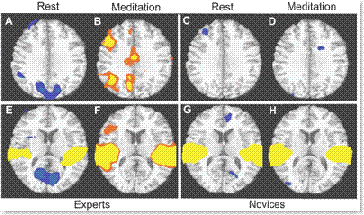People Can Develop Skills that Promote Happiness and Compassion
A news release yesterday from the University of Wisconsin-Madison reports findings from a research study on the effects of compassion meditation on brain circuitry:
Cultivating compassion and kindness through meditation affects brain regions that can make a person more empathetic to other peoples' mental states, say researchers at the University of Wisconsin-Madison.
Published March 25 in the Public Library of Science One, the study was the first to use functional magnetic resonance imaging (fMRI) to indicate that positive emotions such as loving-kindness and compassion can be learned in the same way as playing a musical instrument or being proficient in a sport. The scans revealed that brain circuits used to detect emotions and feelings were dramatically changed in subjects who had extensive experience practicing compassion meditation.
The research suggests that individuals - from children who may engage in bullying to people prone to recurring depression - and society in general could benefit from such meditative practices, says study director Richard Davidson, professor of psychiatry and psychology at UW-Madison and an expert on imaging the effects of meditation.
Various techniques are used in compassion meditation, and the training can take years of practice. The controls in this study were asked first to concentrate on loved ones, wishing them well-being and freedom from suffering. After some training, they then were asked to generate such feelings toward all beings without thinking specifically about anyone.
Each of the 32 subjects was placed in the fMRI scanner at the UW-Madison Waisman Center for Brain Imaging, which Davidson directs, and was asked to either begin compassion meditation or refrain from it. During each state, subjects were exposed to negative and positive human vocalizations designed to evoke empathic responses as well as neutral vocalizations: sounds of a distressed woman, a baby laughing and background restaurant noise.
Figure 2. Meditation modulates right insula response to emotional sounds: Average response in (Insula) for experts (red) and novices (blue)
The scans revealed significant activity in the insula - a region near the frontal portion of the brain that plays a key role in bodily representations of emotion - when the long-term meditators were generating compassion and were exposed to emotional vocalizations. The strength of insula activation was also associated with the intensity of the meditation as assessed by the participants.
Areas showing a negative (dark blue, blue) or positive (orange, yellow) impulse response on average across 10 seconds in responses to all emotional sounds for the 15 novices and 15 experts at z=31 compared to baseline (figs. A–D) and z = 13 (figs. E–H)
"The insula is extremely important in detecting emotions in general and specifically in mapping bodily responses to emotion - such as heart rate and blood pressure - and making that information available to other parts of the brain," says Davidson, also co-director of the HealthEmotions Research Institute.
Activity also increased in the temporal parietal juncture, particularly the right hemisphere. Studies have implicated this area as important in processing empathy, especially in perceiving the mental and emotional state of others.
"Both of these areas have been linked to emotion sharing and empathy," Davidson says. "The combination of these two effects, which was much more noticeable in the expert meditators as opposed to the novices, was very powerful."
The findings support Davidson and Lutz's working assumption that through training, people can develop skills that promote happiness and compassion.
"People are not just stuck at their respective set points," he says. "We can take advantage of our brain's plasticity and train it to enhance these qualities."
Meditation instruction given to participants
As described in Dr. Matthieu Ricard's instructions for novices: “During the training session, the subject will think about someone he cares about, such as his parents, sibling or beloved, and will let his mind be invaded by a feeling of altruistic love (wishing well-being) or of compassion (wishing freedom from suffering) toward these persons. After some training the subject will generate such feeling toward all beings and without thinking specifically about someone. While in the scanner, the subject will try to generate this state of loving kindness and compassion.”



